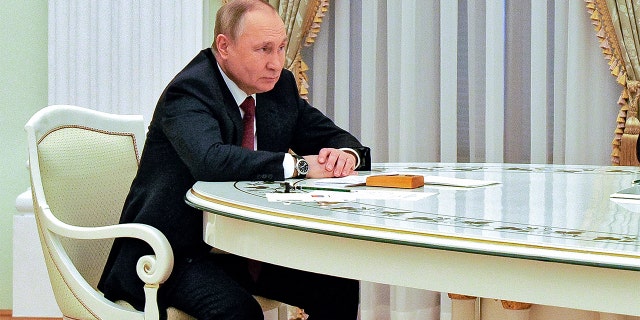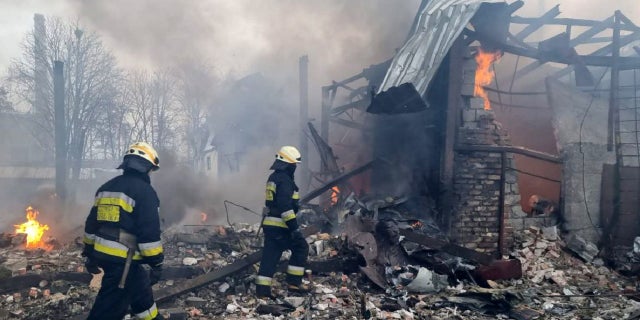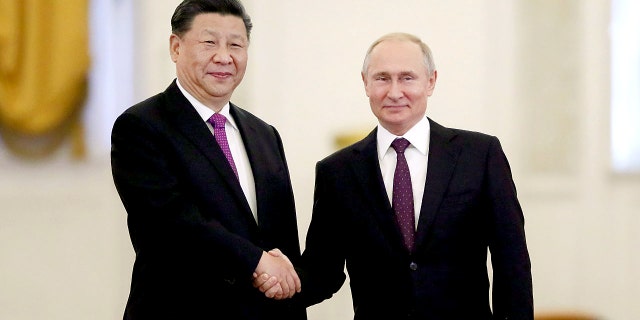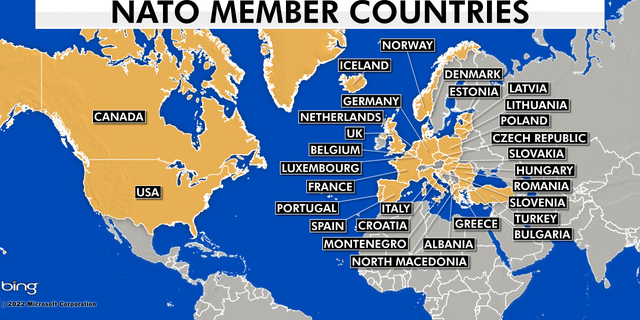by Audrey Conklin
The reputational damage of Putin's invasion of Ukraine 'will cripple Russia for a generation to come'
Russian President Vladimir Putin is becoming a "pariah," an outcast, before the world stage amid his ongoing invasion of Ukraine, foreign policy experts say.
While experts believe it's too soon to determine whether Putin will be successful in his attempts to take control of Ukraine — acknowledging that there will likely be some form of a partial victory — it is clear that the Russian dictator has done irreversible damage to his own country with the invasion.
Russia's pariah status
"On the global scale, Russia will turn into a pariah. … It has already been on that path for several years and definitely the last year. Putin has been a pariah for even longer," former Defense Intelligence Agency specialist Rebekah Koffler, who was born in Russia, told Fox News Digital. "The deal with Putin is that he would rather be feared than [ignored] because fear, in Russian culture, means respect. He is quite used to the pariah status."
While Koffler believes "a segment of the Russian population" is antiwar and sees what is happening in Ukraine, she noted that Russians have voted Putin into office four times.

Russian President Vladimir Putin listens to Hungary's Prime Minister Viktor Orban during their meeting in the Kremlin in Moscow Feb. 1, 2022. (Mikhail Klimentyev, Sputnik, Kremlin Pool Photo via AP)
"They don't think like Americans. They think like Russians. They have always wanted somebody who is as strong as Putin, bordering on being brutal, because that's what Russians believe is good for the country's security," Koffler explained, adding that "Russian propaganda" is very effective in swaying civilians.
Conversely, Robert English, a professor of Central European Studies at the University of Southern California, believes Putin will face growing opposition at home.
RUSSIA INVASION OF UKRAINE CONTINUES: LIVE UPDATES
"I think Putin's future is grim. I think, at home, he will be under the constant threat of opposition — possibly of a coup, some kind of power grab — to remove him because even his closest allies are now seeing the problem," English said. "And if they gain less by staying loyal than they would if he's replaced, it's just a matter of how to do it."
Even once Russia's war in Ukraine has concluded and Putin is no longer in power, the reputational damage of the invasion "will cripple Russia for a generation to come," according to English.
"Anybody with something to give for Russia's future technological and economic revival is trying to leave right now if they haven't already, so it will be a hollow country, and that's something it takes a generation to recover from."
As Western countries place heavy sanctions on Russia and Russian oligarchs, the country's civilian population will suffer worse economically over time. Putin, therefore, is his own greatest threat, according to English.

Firefighters at a site after airstrikes hit civil settlements as Russian attacks continue on Ukraine in Dnipro, Ukraine, March 11, 2022. (State Emergency Service of Ukraine/HANDOUT/Anadolu Agency via Getty Images)
"Eventually, the loss of troops, the loss of foreign investment, the loss of public support, the economic drain — all those are facts that he can't ignore indefinitely," the professor said. "But I think he's resisting that because he's living … in a world of slanted intelligence and illusions and utopian ideas about a return of the Russian Empire that will take some time to crumble away. And he's resisting it mightily, still trying to come up with that military victory, even as everyone else can see it grinding to a halt."
UKRAINE'S ZELENSKYY ADDRESSES CONGRESS, INVOKES 9/11, PEARL HARBOR, MLK AS HE PLEADS FOR PIVOTAL AID
Brookings Institution Foreign Policy Director of Research Michael O'Hanlon similarly said Putin "thinks more historically with reference to other Russian leaders" but still thinks "he is smarter and tougher" than most global powers.
Russia-China relations
O'Hanlon added that Putin "is more radical" than Chinese President Xi Jinping, who asked Putin to negotiate with Ukraine last month but has otherwise attempted to appear neutral about the war.
Foreign policy pundits have drawn parallels between Russian President Vladimir Putin's efforts to control Ukraine's democratic government and Chinese President Xi Jinping's desire to make Taiwan part of China. Russia and China are allied to the extent that they hope to dominate Western powers, but the two countries differ in their approaches to achieving superiority.
"Xi has ambitions in Asia. He wants to recover historic Chinese territory. And what's more, Xi wants to establish a sphere of influence in that region and push America out. That hasn't changed," English explained. "And to the extent that Xi's worried that NATO's become emboldened — that the West is going to push back harder against him now — Xi's not happy. … It simply means he has to recalibrate."

Russian President Vladimir Putin shakes hands with his Chinese counterpart Xi Jinping at the Kremlin in Moscow June 5, 2019. (REUTERS/Evgenia Novozhenina/Pool)
The USC professor added that China needs Russia as an ally because the country is dependent on Russian energy, and it has a similar goal of "tying down" NATO allies in the West. While supporting Russia's invasion would be "bad for China's reputation," and Xi does not appreciate "how messy and destructive" the war in Ukraine has become, "it doesn't mean he's going to give up his ambitions and China will now become a settled liberal power instead of rising revisionist power in Asia," English said.
Additionally, Russia's invasion of Ukraine will have a significant impact on the West as oil and commodity prices rise, the European economy faces a recession directly after the COVID-19 pandemic and European countries take in millions of Ukrainian refugees.
"Everyone wants the Ukrainians now, and we're all trying to help. But it won't be long before that burden on Germany and Poland — on other neighboring countries — will be felt in political discontent," English explained. "All of that is going to tie the West down and weaken us five or 10 years out. And that is to China's advantage. So Xi is playing it both ways. Xi sees danger in being too close to Russia for China's reputation. But he also sees advantage in this. The West is tied down and also weakened."
RUSSIAN PEOPLE HURTING FROM SANCTIONS, BUT THEY MAY BE RALLYING TO PUTIN: RUSSIAN-AMERICAN
Koffler similarly said the Chinese president is "happy" the United States "is being challenged by Putin in this way" and feels "encouraged" regarding his "plans to take over Taiwan." She added that China and Russia are not so much a strategic alliance as they are an "act of contingency," but "that would not prevent them from synchronizing … some military operations to challenge the U.S."
NATO's future
Still, Koffler believes Putin's greatest threat is U.S. and NATO intervention into the conflict in Ukraine despite the challenges facing NATO countries due to the consequences of Russia's war.
On the other hand, Koffler says NATO "is not really united," and while Russia's war in Ukraine may strengthen the alliance, it is "divided" between "the old Europe and the new Europe," which perceive threats from Russia "very differently."
"There are still a lot of gaps to be closed in their perception of [Russia's] threat, and most importantly, their willingness to do something about that threat because I don't see them weaning themselves off of their addiction to Russian energy," she said. "And … not all of them contribute the 2% of their GDP to the collective security treaty."

The map shows NATO member countries (Fox News)
The North Atlantic Treaty Organization is an intergovernmental, military-political alliance between the United States, Canada and a number of European countries. NATO was founded after World War II in 1949 in an effort to protect NATO countries against threats from Russia — then the Soviet Union.
Ukraine is not part of NATO, which plays no formal role in Russia's war with Ukraine, but Ukrainian President Volodymyr Zelenksyy has called on NATO officials to enact a no-fly zone over his country to stop Russian missile attacks. Most NATO officials have thus far denied those requests, citing concerns of a third world war against Russia.
Some commentators have argued that NATO is not serving its purpose to defend the West from Russian aggression and has instead provoked Russia as NATO allies expand further East.
"As crazy and as violent and as renegade as Putin has been, there will be people pointing out that [NATO] didn't handle Russia well. That we helped, in some part, stoke some of that Russian resentment," English said.
Further expansion of NATO, therefore, is "something we ought to be very careful about," he continued.
Fox News' Tyler Olson contributed to this report.
Audrey Conklin is a digital reporter for FOX Business and Fox News. Email tips to audrey.conklin@fox.com or on Twitter at @audpants.
Source: https://www.foxnews.com/world/russia-invasion-putin-pariah-ukraine-invasion
No comments:
Post a Comment